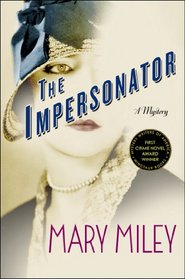Helpful Score: 1
I have long been an admirer of plots revolving around an impersonator-- like Josephine Tey's Brat Farrar-- so I looked forward to reading this book with a great deal of anticipation. I was not disappointed. Mary Miley has written an exceptional book filled with the history of vaudeville, the sights and sounds of the 1920s, and one very fascinating character in Leah Randall.
As the novel begins, Leah is very much a product of her vaudeville upbringing: free from prejudice, fast off the mark with the latest slang or quip, quick at reading people and at thinking through the consequences of her actions... well, most of the time. Her jobless situation makes her desperate enough to underestimate the slimy Oliver Beckett. Desperation can do that to even the most honest of people. The Impersonator works because Leah is always such a believable and sympathetic character. She may have the lead role in "She Stoops to Con," but she remains truthful to herself about what she's doing.
As Leah stays at the family compound in Oregon, she disappears more completely into her role as Jessie, and her speech and a few mannerisms begin to change. Her attitude towards some of the family members begins to change as well-- including how she feels about Jessie, whom Leah knows must be dead:
"I had come to think of myself as her stand-in, her understudy, called up to take the part she couldn't finish. Jessie had crept under my skin. I cared for her. I wanted to know who had killed her. I wanted someone to pay for the crime."
But there's a major impediment to Leah's finding Jessie's killer: she can't investigate her own murder. Part of the enjoyment in reading The Impersonator lies in watching Leah invent reasons to do things that will help her in proving the murderer's identity. You see, it's not that difficult to deduce who did it. The problem-- and the danger-- lies in proving it.
I enjoyed this book from first page to last, and I look forward to reading more of Leah Randall's adventures. From working with vaudevillians the likes of Jack Benny and Milton Berle to impersonating an heiress. What next? Hollywood?
As the novel begins, Leah is very much a product of her vaudeville upbringing: free from prejudice, fast off the mark with the latest slang or quip, quick at reading people and at thinking through the consequences of her actions... well, most of the time. Her jobless situation makes her desperate enough to underestimate the slimy Oliver Beckett. Desperation can do that to even the most honest of people. The Impersonator works because Leah is always such a believable and sympathetic character. She may have the lead role in "She Stoops to Con," but she remains truthful to herself about what she's doing.
As Leah stays at the family compound in Oregon, she disappears more completely into her role as Jessie, and her speech and a few mannerisms begin to change. Her attitude towards some of the family members begins to change as well-- including how she feels about Jessie, whom Leah knows must be dead:
"I had come to think of myself as her stand-in, her understudy, called up to take the part she couldn't finish. Jessie had crept under my skin. I cared for her. I wanted to know who had killed her. I wanted someone to pay for the crime."
But there's a major impediment to Leah's finding Jessie's killer: she can't investigate her own murder. Part of the enjoyment in reading The Impersonator lies in watching Leah invent reasons to do things that will help her in proving the murderer's identity. You see, it's not that difficult to deduce who did it. The problem-- and the danger-- lies in proving it.
I enjoyed this book from first page to last, and I look forward to reading more of Leah Randall's adventures. From working with vaudevillians the likes of Jack Benny and Milton Berle to impersonating an heiress. What next? Hollywood?




![header=[] body=[Get a free book credit right now by joining the club and listing 5 books you have and are willing to share with other members!] Help icon](/images/question.gif?v=29befa08)
